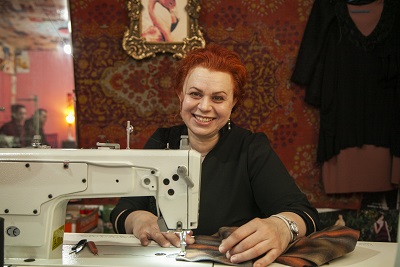New opportunities for refugee women living in Georgia
Date:
Natalia Patina was 9 years old when she sat at her grandmother’s sewing machine for the first time. She remembers that she got interested in sewing right from that moment.

As the years went by, she began her career as a teacher, then as a financial specialist. She had respective jobs in both fields, but she never stopped sewing. Little by little, this hobby became a source of additional income for her.
Natalia’s life changed completely when she was 40 years old. “I was living on the outskirts of Donetsk City when combat operations started in Ukraine,” she remembers. “Due to safety reasons, I had to leave my house and find shelter in Georgia with my husband and my underage daughter Nila.”
Her favorite hobby helped her when she came to Georgia. Soon after acquiring refugee status, she started working as an assistant at one of the local ateliers. She has worked at several tailor’s shops since then, but deep down she had always dreamed of opening a shop of her own. This is when she received a call from the Office of the United Nations High Commissioner for Refugees (UNHCR), offering her to attend the training course “How to Start up a Business” at the Academy of the Ministry of Finance.
The training was a part of the joint project implemented by UN Women and UNHCR - “Support to Refugee Women’s Integration in Georgia”. It aimed at empowering the refugee women residing in Georgia, protecting them from gender-based violence and enhancing their economic opportunities.
According to the official statistics of the Government of Georgia, of the 2,091 refugees residing in the country, 46 per cent are women. Employment is one of the main challenges with refugee integration. This is why the project has placed its emphasis on opportunities for developing small businesses. More than 50 refugee women attended the training, including Natalia Patina. Natalia remembers that she went to the first meeting because of interest, but then she was attracted by the atmosphere, course content and practical skills-sharing. She has also learned about a new, important opportunity available to her: the course graduates were given the chance to participate in the call for grant proposals announced by UN Women and the Georgian Farmers’ Association, which aimed at financing the best business ideas.
Natalia had already had the idea to open her own atelier. She filled in the business plan and tried to clearly demonstrate that she really wanted to develop and build her business. Eventually, she was among 23 women whose business ideas were successfully financed.
She recalls: “I bought new sewing machines with modern functionalities the very next day, with irons, scissors and other devices. Then my husband, my daughter and I renovated a garage near our house with our own hands and turned it into a cozy art-salon of a different design. We gave it a name: Pink Flamingo. I think it is not only about receiving such a grant. Initiatives like this are important because, at the very least, you acquire knowledge, but at the same time, you find like-minded people, you hear various ideas and you improve upon your own.”
Natalia is working with start-up garment designers. Her 16-year-old daughter Nila is helping her considerably in this process. Nila wants to enter the Arts Academy, become a designer and create her own clothing line in the future. As for Natalia, she has many more plans to develop her business activities. For example, she wants to expand her atelier so that she can employ other refugee women from Ukraine and express her support to them this way.